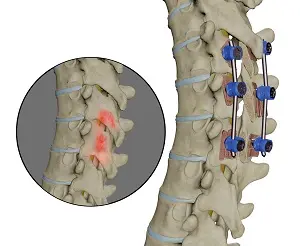Lajpat Nagar Metro Station, Block M, New Delhi, 110024
|096506 82102

Deformity Spine Due to Infections : An Overview
Deformity spine due to infections is a condition characterized by
structural abnormalities in the spinal column caused by infectious agents. This
condition requires specialized treatment to address the infection and correct the spinal
deformities.
Our medical team employs various techniques tailored to each patient's
unique situation to address the infection and restore spinal health. Treatment may
involve a combination of antibiotics, surgical intervention, and rehabilitation
therapies.
Symptoms Indicating Deformity Spine Due to Infections
In cases of deformity spine due to infections, early intervention may be necessary to prevent further complications. We prioritize prompt diagnosis and treatment of spinal infections. Below are common symptoms indicating the need for medical attention:
- 1. Foot drop or leg weakness
- 2. Bowel or bladder dysfunction
- 3. Increasing numbness
- 4. Debilitating pain hampering routine activities
- 5.Progressive and recurrent pain after partial improvement
- 6.Lack of improvement or progression of symptoms despite conservative therapy.
→Precautions and Care for Spinal Deformity
Due to Infections
→ What to Expect During Treatment for Spinal
Deformity
→ Guidelines For Post-Treatment Care
When dealing with spinal deformity caused by infections, certain precautions and care measures are essential to ensure optimal outcomes:
- Consult with your healthcare provider for a comprehensive evaluation and treatment plan.
- Inform your healthcare provider about any medications you are currently taking, as they may affect your treatment.
- Discuss the details of your treatment plan, including any surgical procedures, with your specialist.
- Follow any pre-treatment instructions provided by your healthcare provider, such as dietary restrictions or medication adjustments.
During decompression spine surgery, you can expect the following:
- Your treatment plan may involve surgical procedures, medication therapy, or a combination of both, depending on the severity of your condition.
- During treatment, you may experience some discomfort or side effects, which your healthcare provider will help manage.
- It's important to follow all treatment instructions provided by your healthcare provider and attend all follow-up appointments for monitoring and adjustments to your treatment plan.
- Your healthcare provider will guide you through the recovery process and provide recommendations for resuming normal activities.
- After treatment, it's important to adhere to any post-treatment care instructions provided by your healthcare provider.
- Attend all scheduled follow-up appointments to monitor your progress and address any concerns.
- Take any prescribed medications as directed and report any new or worsening symptoms to your healthcare provider.
- Engage in gentle physical activity as recommended by your healthcare provider to promote healing and prevent complications.
- Ensure a supportive environment at home to facilitate your recovery, and seek assistance from family or friends if needed.
Understanding Spinal Deformity Due to Infections
Spinal deformity
due to infections can be caused by various factors, including:
- Bacterial or viral infections affecting the spine
- Infections introduced during spinal surgeries
- Complications from untreated or improperly treated infections
Spinal deformities due to infections are typically diagnosed through:
- Medical history review and physical examination
- Imaging tests such as X-rays, MRI, or CT scans to visualize the spine and identify any abnormalities
- Lab tests to detect the presence of infectious agents in the body
Treatment options
for spinal deformities due to infections may include:
- Antibiotic therapy to treat the underlying infection
- Spinal surgery to remove infected tissue, stabilize the spine, or correct deformities
- Physical therapy to improve mobility and strengthen muscles
- Pain management techniques to alleviate discomfort
